福建省厦门市2016届高三第二次(5月)质量检测英语试题(图片版)
高三英语下学期模拟考试(5月质检)试题-人教版高三全册英语试题

福州一中2016届高三5月校质检英语试卷总分为:150分完卷时间:120分钟第一局部听力 (共两节,总分为30分)第一节〔共5小题;每一小题1.5分,总分为7.5分〕请听下面5段对话。
每段对话后有一个小题,从题中所给的A、B、C三个选项中选出最优答案,并标在试卷的相应位置。
听完每段对话后,你都有10秒钟的时间来回答有关小题和阅读下一小题。
每段对话仅读一遍。
1. Who is Chris Paine?A. A computer engineer.B. A book seller.C. A writer.2. What are the two speakers talking about?A. A football player.B. A football team.C. A football match.3. Why did the woman buy a heavy coat for Jimmy?A. Winter is coming soon.B. Jimmy will go into the mountains.C. Jimmy has caught a cold.4. Where is the woman?A. In a soap factory.B. In her house.C. At an information desk.5. When is the man checking in?A. Friday.B. Thursday.C. Tuesday.第二节〔共15小题;每一小题1.5分,总分为22.5分〕请听下面5段对话或独白。
每段对话或独白后有几个小题,从题中所给的A、B、C三个选项中选出最优答案,并标在试卷的相应位置。
听每段对话或独白前,你将有时间阅读各个小题。
每一小题5秒钟;听完后各小题将给出5秒钟的作答时间。
每段对话或独白读两遍。
听第6段材料, 回答第6至8题。
6. How does the man feel about David's way of sleeping?A. It's effective.B. It's strange.C. It's the best.7. How many hours does David sleep a day?A. Four.B. Six.C. Seven.8.What does the woman suggest at the end of the talk?A. People should develop a habit like David's.B. People need longer hours of sleep.C. People have different sleeping habits.听第7段材料, 回答第9至11题。
福建省厦门外国语学校2016届高三5月适应性考试英语试题(含答案)
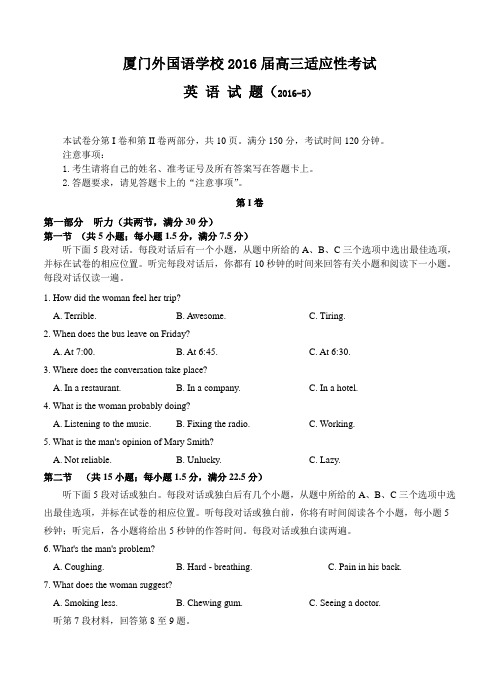
厦门外国语学校2016届高三适应性考试英语试题(2016-5)本试卷分第I卷和第II卷两部分,共10页。
满分150分,考试时间120分钟。
注意事项:1.考生请将自己的姓名、准考证号及所有答案写在答题卡上。
2.答题要求,请见答题卡上的“注意事项”。
第I卷第一部分听力(共两节,满分30分)第一节(共5小题;每小题1.5分,满分7.5分)听下面5段对话。
每段对话后有一个小题,从题中所给的A、B、C三个选项中选出最佳选项,并标在试卷的相应位置。
听完每段对话后,你都有10秒钟的时间来回答有关小题和阅读下一小题。
每段对话仅读一遍。
1. How did the woman feel her trip?A. Terrible.B. Awesome.C. Tiring.2. When does the bus leave on Friday?A. At 7:00.B. At 6:45.C. At 6:30.3. Where does the conversation take place?A. In a restaurant.B. In a company.C. In a hotel.4. What is the woman probably doing?A. Listening to the music.B. Fixing the radio.C. Working.5. What is the man's opinion of Mary Smith?A. Not reliable.B. Unlucky.C. Lazy.第二节(共15小题;每小题1.5分,满分22.5分)听下面5段对话或独白。
每段对话或独白后有几个小题,从题中所给的A、B、C三个选项中选出最佳选项,并标在试卷的相应位置。
听每段对话或独白前,你将有时间阅读各个小题,每小题5秒钟;听完后,各小题将给出5秒钟的作答时间。
每段对话或独白读两遍。
6. What's the man's problem?A. Coughing.B. Hard - breathing.C. Pain in his back.7. What does the woman suggest?A. Smoking less.B. Chewing gum.C. Seeing a doctor.听第7段材料,回答第8至9题。
福建省厦门外国语学校2016届高三5月适应性考试英语试题(含答案)
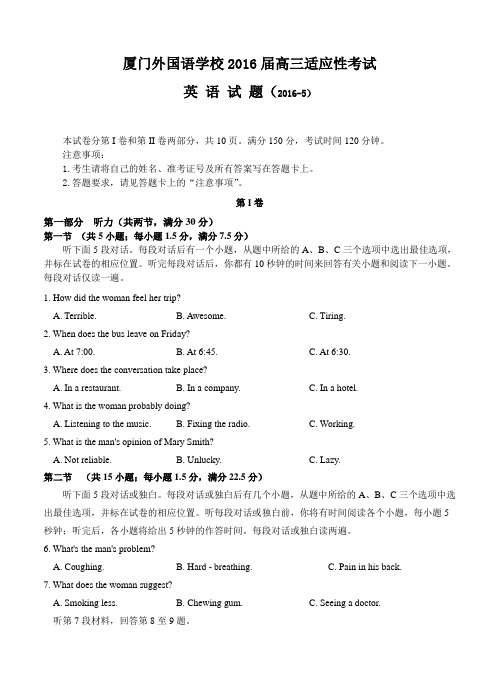
厦门外国语学校2016届高三适应性考试英语试题(2016-5)本试卷分第I卷和第II卷两部分,共10页。
满分150分,考试时间120分钟。
注意事项:1.考生请将自己的姓名、准考证号及所有答案写在答题卡上。
2.答题要求,请见答题卡上的“注意事项”。
第I卷第一部分听力(共两节,满分30分)第一节(共5小题;每小题1.5分,满分7.5分)听下面5段对话。
每段对话后有一个小题,从题中所给的A、B、C三个选项中选出最佳选项,并标在试卷的相应位置。
听完每段对话后,你都有10秒钟的时间来回答有关小题和阅读下一小题。
每段对话仅读一遍。
1. How did the woman feel her trip?A. Terrible.B. Awesome.C. Tiring.2. When does the bus leave on Friday?A. At 7:00.B. At 6:45.C. At 6:30.3. Where does the conversation take place?A. In a restaurant.B. In a company.C. In a hotel.4. What is the woman probably doing?A. Listening to the music.B. Fixing the radio.C. Working.5. What is the man's opinion of Mary Smith?A. Not reliable.B. Unlucky.C. Lazy.第二节(共15小题;每小题1.5分,满分22.5分)听下面5段对话或独白。
每段对话或独白后有几个小题,从题中所给的A、B、C三个选项中选出最佳选项,并标在试卷的相应位置。
听每段对话或独白前,你将有时间阅读各个小题,每小题5秒钟;听完后,各小题将给出5秒钟的作答时间。
每段对话或独白读两遍。
6. What's the man's problem?A. Coughing.B. Hard - breathing.C. Pain in his back.7. What does the woman suggest?A. Smoking less.B. Chewing gum.C. Seeing a doctor.听第7段材料,回答第8至9题。
福建省厦门市2016届高三第二次(5月)质量检查理综试题(WORD版)

厦门市2016届高中毕业班第二次质量检查理科综合能力测试一、选择题1.下列关于人体浆细胞的叙述,正确的是A .细胞核是遗传和代谢的控制中心B .在淋巴因子的作用下可增殖分化C .受抗原刺激后核糖体能合成抗体D .抗体的分泌依次经过高尔基体、内质网和细胞膜2.下列关于噬菌体侵染细菌实验的叙述,正确的是A .用含35S 的培养基培养可获得标记的噬菌体B .搅拌能使大肠杆菌破裂,释放出子代噬菌体C .用35S 标记的一组实验,部分子代噬菌体中能检测到35SD .用32P 标记的一组实验,放射性同位素主要分布在沉淀中3.下列关于“探究温度影响淀粉酶活性”实验的叙述,错误..的是 A .合理设定实验温度属于控制实验的自变量B .淀粉与淀粉酶应分别达到设定温度后再混合C .可选用碘液或斐林试剂对实验结果进行检测D .淀粉的用量和保温时间均可能影响实验结果4.下列关于人体神经调节的叙述,正确的是A .K +外流是大多数神经细胞产生神经冲动的主要原因B .正常机体的神经冲动在反射弧中可以双向传导C .神经递质的释放与生物膜的流动性关系密切D .大脑皮层H 区受损则无法形成听觉5.下列关于生物进化的叙述,正确的是A .一个细胞中所含有的全部基因称为基因库B .有性生殖方式的出现加快了生物进化的速度C .地理隔离是新物种形成的必要条件D .在稳定的生态系统中,种群的基因频率不会发生改变6.马蛔虫是二倍体生物,体细胞中含有4条染色体。
对其精巢切片进行显微观察,根据细胞中观察到的染色体数量进行分类统计,结果如下表所示。
下列叙述正确的是A .观察到含有四分体的细胞应统计在乙组中B .甲组细胞中含有两个染色体组C .乙组细胞占的比例大,是处于分裂间期的细胞D .丙组细胞中可观察到着丝点分裂7.我国南朝(梁)陶弘景著《本草经集注》中记叙药物730种,其中“消石”条目下写道:“…如握雪不冰。
强烧之,紫青烟起,仍成灰…”。
这里的“消石”是指A.氯化钠B.硝酸按C.高锰酸钾D.硝酸钾8.镇痛剂M (苯佐卡因)结构简式如下左图。
2016年福建省普通高中毕业班质量检查英语

2016年福建省普通高中毕业班质量检查英语2016年福建省普通高中毕业班质量检查英语本试卷分第一卷(选择题)和第二卷(非选择题)两部分。
第一卷l至10页,第二卷11至13页,满分150分。
第一卷(选择题满分100分)第一部分听力(共两节,满分30分)做题时,先将答案标在试卷上。
录音内容结束后,你将有两分钟的时间将试卷上的答案转涂到答题卡上。
第一节(共5小题;每小题1.5分,满分7.5分)1. What is the probable age of Mary?A.38.B.40 C.48.2.What has led Amy to success?A. Her intelligence.B. Her effort.C. Her luck.3.How will the man get to the station?A. By train.B. By bus.C. By car.4. What is the probable relationship between the two speakers?A Teacher and student. B.Follow students C.Mother and son5.Why did the man apologize?A. He didn't call on Maria.B. He didn't phone Maria.C. He didn't do homework.第二节(共15小题;每小题I.5分,满分22.5分)听第6段材料,回答第6、7题。
6 Who will go to the Big Boogie?A. Tom.B. Mark.C. Peter.7. What will the woman do next?A. Finish an essay.B. go bird watching.C. Make phone calls.听第7段材料,回答第8、9题。
福建省厦门市2016届高三第二次(5月)质量检查英语试题 含答案

厦门市2016届高中毕业班第二次质量检查英语试题2016。
5本试卷分第I卷和第n卷两部分,共12页。
满分150分.考试用时120分钟。
考试结束后,将答题卡交回.注意事项:1。
答题前,考生务必用0。
5毫米黑色签字笔将自己的学校、班级、胜名、座号、准考证号填写在答题卡和试卷规定的位置上。
2.第I卷每小题选出答案后,用2B铅笔把答题卡上对应题目的答案标号涂黑;如需改动,用橡皮擦干净后,再选涂其他答案标号。
3.第II卷必须用0。
5毫米黑色签字笔作答,答案必须写在答题卡各题目指定区域内相应的位置,不能写在试卷上;如需改动,先划掉原来的答案,然后再写上新的答案;不能使用涂改液、胶带纸、修正带。
不按以上要求作答的答案无效.第一卷(选择题满分100分)第一部分:听力(共两节,满分30分)做题时,先将答案标在试卷上,录音内容结束后,你将有两分钟的时间将试卷上的答案转涂到答题卡上.第一节(共5小题;每小题1。
5分,满分7。
5分)听下面5段对话.每段对话后有一个小题,从题中所给的A, B, C 三个选项中选出最佳选项,并标在试卷的相应位置。
听完每段对话后,你都有10秒钟的时间来回答有关小题和阅读下一小题。
每段对话仅读一遍。
例:How much is the shirt?A.£19.15。
B. £9.18。
C. £9.15。
答案是C。
1. Where does the conversation probably take place?A。
On a bus. B。
On a plane。
C。
On a ship.2. What does Lucy want to do?A。
Study hard. B. Lose weight. C. Set a goal.3。
What are the speakers talking about?A。
A movie。
B. A character。
C。
A story.4。
What are the speakers going to do?A。
高三英语月考试题及答案-厦门外国语学校2016届高三5月适应性考试

厦门外国语学校2016届高三适应性考试英语试题(2016-5)本试卷分第I卷和第II卷两部分,共10页。满分150分,考试时间120分钟。注意事项:1.考生请将自己的姓名、准考证号及所有答案写在答题卡上。2.答题要求,请见答题卡上的“注意事项”。第I卷第一部分听力(共两节,满分30分)第一节(共5小题;每小题1.5分,满分7.5分)听下面5段对话。每段对话后有一个小题,从题中所给的A、B、C三个选项中选出最佳选项,并标在试卷的相应位置。听完每段对话后,你都有10秒钟的时间来回答有关小题和阅读下一小题。每段对话仅读一遍。1. How did the woman feel her trip?A. Terrible.B. Awesome.C. Tiring.2. When does the bus leave on Friday?A. At 7:00.B. At 6:45.C. At 6:30.3. Where does the conversation take place?A. In a restaurant.B. In a company.C. In a hotel.4. What is the woman probably doing?A. Listening to the music.B. Fixing the radio.C. Working.5. What is the man's opinion of Mary Smith?A. Not reliable.B. Unlucky.C. Lazy.第二节(共15小题;每小题1.5分,满分22.5分)听下面5段对话或独白。每段对话或独白后有几个小题,从题中所给的A、B、C三个选项中选出最佳选项,并标在试卷的相应位置。听每段对话或独白前,你将有时间阅读各个小题,每小题5秒钟;听完后,各小题将给出5秒钟的作答时间。每段对话或独白读两遍。6. What's the man's problem?A. Coughing.B. Hard - breathing.C. Pain in his back.7. What does the woman suggest?A. Smoking less.B. Chewing gum.C. Seeing a doctor.听第7段材料,回答第8至9题。8. What does the woman think of the show?A. Inspiring.B. Just so-so.C. Thrilling.9. Which part did the woman like best about the show?A. Designer wear.B. Live models.C. Clothes recycling.听第8段材料,回答第10至12题。10. What is the probable relationship between the speakers?A. Salesman and customer.B. Old schoolmates.C. Fellow workers.1l. What is the man?A.A lawyer.B. A salesperson.C. A computer manager.12. Why does the woman ask for the man's address?A. To give him a ride.B. To repair something for him.C. To get together with him 听第9段材料,回答第13至16题。13. What does the woman want?A. Dark brown clothes.B. Country-style tables.C. Some saucepans.14. Who saw the products yesterday?A. The woman's neighbor.B. The woman.C. Mr. May.15. What does the shopkeeper tell the woman?A. All the products are 50% off.B. What she wants has been sold out.C. The new styles will come tomorrow.16. What will the woman do?A. Wait for 5 minutes.B. Go to another shop.C. Come back tomorrow.听第10段材料,回答第17至20题。17. In how many countries is TOEFL given?A.118.B.180.C.121.18. How many people take the IELTS every year?A. Two million.B. One million.C. 20, 000.19. How much will you pay for the TOEFL if you want to test yourself in the four basicskills?A. 125 dollars.B. 150 dollars.C. 275 dollars.20. What can we learn about the IELTS?A. It's a paper test.B. It doesn't include speaking test.C. It's only open for undergraduate students.第二部分阅读理解(共两节,满分40分)第一节(共15小题;每小题2分,满分30分)AThe following safety risks may result in serious injury or death to the user of theMINI Cooper S:This product contains small parts that are for adult assembly (组装) only. Keepsmall children away when assembling. Remove all protective materials before assembly. Be sure to remove all packaging materials and parts from underneath thecar body.Battery posts contain lead known to the state of California to cause cancer and reproductive harm. Never open the battery.Body parts such as hands, legs, hair and clothing can get caught in moving parts. Never place a body part near a moving part or wear loose clothing while using the vehicle. Always wear shoes when using the vehicle.Using the vehicle near streets, motor vehicles, drop-offs such as steps, water (swimming pools) or other bodies of water, hills, wet areas, in alleys, at night or in the dark could result in an unexpected accident. Instead, use the vehicle on the highway. Always use the vehicle in a safe, secure environment.Using the vehicle in unsafe conditions such as snow, rain, loose dirt, mud, or sand may result in unexpected action, for example tip over.Using the vehicle in an unsafe manner may result in unexpected outcome. Examples include but are not limited to:Pulling the vehicle with another vehicle or similar deviceAllowing more than two ridersPushing the user from the backTraveling at an unsafe speedAlways use common sense and safe practices when using the vehicle.Store the vehicle indoors or cover it to protect it from weather. Water will damage the motor, electric system, and battery.21. When assembling, you should ____________________.A. open the battery on the spotB. ignore the packaging materialsC. keep small children off the spotD. take away all protective materials22. According to the text, it is safer to ____________________.A. drive on the highway instead of on hillsB. push the user from behind at the startC. have at least four passengersD. wear loose clothes while using the vehicle23. Where can we probably find the text?A. An official report.B. A popular magazine.C. A physics textbook.D. A product handbook.BIt was days or even weeks since I had been left on the island. My only companion was a dog called Philly which had survived the shipwreck. Memories of what happened were still fresh.The magnificence of the ship had given us all a false sense of security. As the first signs of the storm started, our captain announced it’s nothing much, just another storm. Yet, he was wrong! The storm hit the ship so badly that large holes were made at the sides of the ship. As the freezing water started rushing in, our ship was consumed quickly by the dark water.My train of thought was disturbed by Philly licking my hand dearly. Are you hungry? I spoke my first words ever since the shipwreck occurred. Woof, woof! Barked Philly enthusiastically. At this moment, my stomach gave a loud growl, too. I could not remember when my last meal was, probably a ten-course dinner on the ship. As I had never fished before, I thought maybe I could try something simpler, like picking fruits. With Philly at my side, armed with a sharp branch, we walked into the forest on the island together. Suddenly I thought I heard noises. Could there be anyone else on this island? I wondered. As we were looking for fruit trees, we chanced upon onethat bore yellow, juicy-looking fruit. Philly started barking-we had company. It was a dark-skinned woman, holding a sharp spear, dressed in fur and grass. I backed away from her, afraid that she would be aggressive. Then, I saw that she was trying to save us. Pointing her spear at the fruit tree, she shook her head strongly.I nodded at her to show I understood what she was saying. Signaling to us to follow her, she turned to walk along a small path that I had never noticed. At the end of the small path, there wasa small village. Tears of joy filled my eyes.24. What happened to the ship the writer had been on?A. It was frozen in the sea.B. It was turned over by the storm.C. It was deserted because it was insecure.D. It sank due to the damage caused by the storm.25. According to the passage, which of the following can best describe Philly?A. Active and friendly.B. Caring but aggressive.C. Smart and faithful.D. Noisy but enthusiastic.26. Why did the writer walk into the forest?A. To take shelter from the storm.B. To go to a small village.C. To find someone for help.D. To look for something to eat.27. The woman most probably tried to tell the writer that ________________.A. the fruit tree wasn't the best choiceB. the fruit was unfit for eatingC. the writer wasn't allowed to pick the fruitD. she wasn't afraid of the writerCA machine that takes sweat-laden (浸满汗水的) clothes and turns the sweat into drinking water is in use in Sweden. The machine makes the clothes turn round quickly, heats them to remove the sweat, and then passes the steam through a kind of special material to make purified water(净化水).Since it has been brought into use, its creators say more than 1000 people have drunk others’ “sweat” in Gothenburg. They add the liquid is cleaner than local tap water.The device was b uilt for the United Nations’ child-focused charity UNICEF to promote a campaign highlighting the fact that 780 million people in the world lack access to clean water.The machine was designed and built by the engineer Andreas Hammar, known locally for his appearances on TV tech show “Mekatronik”. He said the key part of the sweat machine was a new water purification part developed by a company named HVR.“It uses a technique called membrane distillation (膜蒸馏),” he told the BBC. “We use a special kind of material that only lets steam through but keeps bacteria, salts, clothing fibers and other things out. They have something similar to the International Space Station, but our machine is cheaper to build. The amount of water it produces depends on how sweaty the person is, but one person’s T-shirt typically produces 10ml, about a mouthful.”The device has been put on show at the Gothia Cup-the world’s largest international youth football tournament. Mattias Ronge, chief executive of Stockholm-based advertising agency Deportivo, said the machine had helped raise awareness for UNICEF, but in reality had its limitations.“People haven’t produced as much sweat as we hoped – right now the weather in Gothenburg is lousy,” Mattias Ronge said. “So we’ve equipped the ma chine with exercise bikes and volunteers are cycling like crazy. Even so, the demand for sweat is greater than the supply. And the machine will never be produced in large numbers, since there are better solutions out there such as water purifying pills.”28. UNICEF is mentioned in the text to ________.A. show how the sweat machine worksB. tell us who invented the sweat machineC. show the importance of the United NationsD. explain why the sweat machine was invented29. Which of the following is the disadvantage of the sweat machine?A. The amount of water the machine produces is rather limited.B. It costs a large amount of money to build the machine.C. It takes too long for the machine to produce water.D. The water processed by the machine is not clean enough.30. What did Mattias Ronge think of the sweat machine?A. It did not work at all.B. It was not worth popularizing.C. It could only be used in summer.D. The water it produced tasted sweet.31. What is the passage mainly about?A. A better solution to purifying dirty water is discovered.B. 780 million people in the world lack access to clean water.C. A machine which turns sweat into drinking water is invented.D. Water purifying pills are solutions to the water problem.DThere’s no doubt that our character has a profound effect on our future. What we must remember, however, is not merely how powerful character is in influencing our fate (命运), but how powerful we are in shaping our own character and, therefore, our own fate. Character may determine our fate, but character is not determined by fate.It’s a common mistake to think of character as something that is fully formed and fixed very early in life. It calls to mind old proverbs like “A leopard can’t change its spots” and “You can’t teach an old dog new tricks.”This perspective that our character is etched in stone is supported by a great deal of modern psychology emphasizing self-acceptance. As Popeye says, “I am what I am.” The hidden message is: Don’t expect me to be more, better, or different.Ultimately, these views of humanity totally undervalue the lifelong potential for growth that comes with the power of reflection and choice.How depressing it would be to believe that we can’t choose to be better, more honest, more respectful, more responsible, and more caring. None of us should give up the personal seeking to improve our character. Not because we’re bad, we don’t have to be sick to get better , but because we’re not as good as we could be.There are so many things in life we can’t control, whether we’re beautiful or smart, whether we had good parents or bad, whether we grew up with affirmation or negation. It’s inspiring to remember that nothing but moral will power is needed to make us better.No, it isn’t easy. But if we make a great effort to become more aware of the habits of heartand mind that drive our behavior, we can begin to place new emphasis on our higher values so that we become what we want our children to think we are.32. What does the underlined part in Paragraph 3 mean?A. is carved in the stone with knivesB. is controlled by oneselfC. can’t be changed easilyD. can be better and different33. Which of the following would the writer agree with?A. We should value our lifelong potential for growth.B. We must attach importance to self-acceptance.C. A leopard can’t change its spots.D. We should make choices constantly.34. What do we need to improve ourselves according to the author?A. Our smartness.B. Our will power.C. Our fate.D. Our character.35. What is the best title of the passage?A. We shape our own character.B. Character determines our fate.C. Character can be formed and fixed.D. Changing our character isn’t easy.第二节(共5小题;每小题2分,满分10分)Being Left-handed in a Right-handed WorldThe world is designed for right-handed people, but why does a tenth of the population prefer the left? 71The answer to it remains a bit of a mystery. Since scientists have noticed that left-handedness tends to run in families, it’s assumed that left-handedness has a genetic(基因的) component to it.72 In fact, identical twins, who share the same genes, can sometimes prefer to use different hands. There are also plenty of theories on what else might determine which hand you write with, but man y experts believe that it’s kind of random.Historically, the left side and left-handedness have been considered a negative thing by many cultures. 73 In some areas, the left hand became known as the “unclean” hand. In many religions, the right hand of God is the favored hand. For example, Jesus sits at God’s right side. God’s left hand, however, is the hand of judgement. V arious activities and experiences become rude or even signs of bad luck when the left hand becomes involved. In some parts of Scotland, it is considered bad luck to meet a left-handed person at the start of a journey. 74 A persongiving directions will put their left hand behind them and even physically try to point with their right hand if necessary. In some Asian countries, eating with the left hand is considered impolite.75 People come to realize that left-handedness is natural. People even noticed that many famous people are left-handed, including Benjamin Franklin, Leonardo Da Vinci, and Charlie Chaplin. Some researchers find out that lefties are more creative and can deal with abstract thinking better. The left-handedness is more easily adaptable to the right-handed world as well. Being left-handed is no longer a sad story now; instead, it is a wonderful gift or maybe it is something you should take pride in.A. In other words, left-handers are born that way.B. Left-handedness used to be regarded as a disability.C. The unfavorable associations of the use of the left hand among cultures are varied.D. Why do they prefer to use their left hand rather than their right hand for routine activities?E. Why do some parents force their left-handed children to become right-handed when writing?F. In Ghana, pointing, gesturing, giving or receiving items with the left hand is considered rude.G. Fortunately, nowadays most societies and cultures no longer reject left-handedness like before.第三部分英语知识运用(共两节,满分45分)完形填空(共20小题;每小题1.5分,满分30分)阅读下面短文,从短文后各题所给的四个选项(A、B、C和D)中,选出可以填入空白处的最佳选项。The train shook back and forth. The carriage was filled with passengers, cold and 41 by the journey. Suddenly, a little boy 42 his way through the grown-ups’ legs and sat down by the window. What a 43 child, I thought. His father 44 to stay by the door behind us.The train began to crawl into a tunnel. Then, unexpectedly, the little boy 45 down from his seat and leaned his hand on my knee. 46 , I thought that he wanted to 47 me and return to his father, but instead he held his 48 up towards me. Oh, he wanted to say something to me;I 49 my head to receive his message. What I did receive was such a 50 kiss on the cheek that everyone could hear it.The boy calmly returned to his seat. I felt 51 . What had just happened? A child kissed a(n) 52 grown-up on the train! But that’s not the end of the story. Soon enough, all my neighbors were certainly 53 Nervous and a little surprised, we 54 at the father. Seeing our questioning 55 , he offered an answer as he got ready for his stop. “My boy is so happy to be alive,” the father said. “He has been very sick.”Father and son 56 into the crowd moving toward the exit. The doors closed and the train went on. On my cheek I can still 57 the child’s kiss. “How many 58 kissing each other for the joy of being alive like the boy? How many even give much thought to the privilege of 59 ?”The little kisser taught us a sweet but serious lesson: be careful; don’t let yourself 60 before your heart stops!41. A. excited B. exhausted C. delighted D. surprised42. A. led B. came C. lost D. pushed43. A. brave B. generous C. casual D. helpful44. A. tended B. promised C. chose D. hesitated45. A. turned B. settled C. slid D. put46. A. Over time B. For a moment C. At no time D. Once in a while47. A. kick B. strike C. search D. pass48. A. eye B. ear C. nose D. head49. A. raised B. shook C. lowered D. held50. A. loud B. long C. foolish D. hungry51. A. disappointed B. shocked C. satisfied D. worried52. A. well-educated B. smart C. unknown D. experienced53. A. praised B. kissed C. scolded D. persuaded54. A. smiled B. shouted C. whispered D. pointed55. A. looks B. gestures C. characters D. images56. A. pulled B. rushed C. disappeared D. followed57. A. receive B. trust C. smell D. feel58. A. go around B. look around C. give away D. turn away59. A. sharing B. touching C. moving D. living60. A. hurt B. die C. beat D. panic第II 卷第三部分英语知识运用(共两节,满分45分)第一节(共10小题;每小题1.5分,满分15分)阅读下面材料,在空白处填入适当的内容(1个单词)或括号内单词的正确形式。A radio host was so 61 (determine) to get listeners in the Christmas spirit that he locked62 (he) in a studio and played Wham’s Last Christmas, on repeat, 24 times.Joe Kohlhofer began 63 8 am drive-time show on Austria’s Antennae Carinthia station by blocking the door to the station with a wooden chair and 64 (tell) his co-host he would be presenting on his own.His partner could 65 (apparent) only watch through the glass wall as Kohlhofer took 66 (call) from listeners begging him to stop playing the song, which was put on loop for almost two hours.And according to Austrian media reports, the host gave up his Christmas protest only 67 his own four-year-old daughter was put 68 line, saying she didn’t like the song.What will happen next to Kohlhofer remains 69 (clear). The station claimed that his behaviour was unplanned, and they haven’t made any decision about his future. 70 the programme director told Austria’s Kurier newspaper that the host could face “consequence”. It might be his “Last Christmas” at the station.第四部分写作(共两节,满分35分)第一节短文改错(共10小题;每小题1分,满分10分)假定英语课上老师要求同桌之间交换修改作文,请你修改你同桌写的以下作文。文中共有10处语言错误,每个句子中最多有两处。每处错误仅涉及一个单词的增加、删除或修改。增加:在缺词处加一个漏字符号(∧),并在其下面写出该加的词。删除:把多余的词用斜线(\)划掉。修改:在错的词下画一横线,并在该词下面写出修改后的词。注意:1. 每处错误及其修改均仅限一词;2. 只允许修改10处,多者(从第11处起)不计分。Dear David,I’m glad that you’ve noticed our efforts directed towards environmental protection. Thanks your concern.Although too much use of plastic bags has caused serious white pollution, our government encouraged us to use environmentally–friendly shopping bags. These bags are made of a variety of material that can be easily treated when they become a rubbish. Besides, they can be reused. Realized the advantages of such bags, more and more people have started using it.I believe that the widely use of these shopping bags can improve their environment. This is one of the many steps we take to make our country an even clean place.第二节书面表达(满分25分)假如你是李华,从网上得知某世界组织正开展“世界公民作文比赛”(the World Citizen Essay Contest)活动,主题为“The worldwide water crisis”,你有意参加。以下是该作文比赛的提示, 请你给组办方写一封信,咨询该活动的有关细节。要点应包括以下内容:1. 该活动的目的;2. 参赛者分组情况;3.作文的长度; 4、作文提交截止日期;5、比赛结果公布时间。注意:1、词数100左右;2、可以适当增加细节,以使行文连贯;3、开头语已为你写好。Dear Sir/Madam,I’m a middle school student in China._________________________________________________________________________ _______________________________________________________________________________Yours sincerely,Li Hua参考答案听力:1. B2.A3.C4.C5.A6.A7.B8.A9.C 10.B11. A 12.C 13.C 14.A 15.B 16.C 17.B 18.B 19.C 20.A阅读:21CAD 24 DCDB 28 DABC 32 CABA 36 DACFG完形:41 BDACC 46 BDDCA 51 BCBAA 56 CDADB语法填空:61 determined 62 himself 63 the/his 64 telling65 apparently 66 calls 67 when/after68. on 69 unclear 70 But改错:Dear David,I’m glad that you’ve noticed our efforts directed towards environmental protection. Thanks ∧for your concern.AlthoughAs too much use of plastic bags has caused serious white pollution, our government encouragedencourages us to use environmentally–friendly shopping bags. These bags are made of a varietyof materialmaterials that can be easily treated when they become a rubbish. Besides, they can be reused.RealizedRealizing the advantages of such bags, more and more people have started usingit them .I believe that the widelywide use of these shopping bags can improvetheirour environment. This isone of the many steps we take to make our country an evenclean cleaner place.书面表达:Dear Sir/Madam,I’m a middle school student in China. I have seen your advertisement and the theme of the essay arouses my interest. I’d like to know something more about “the World Citizen Essay Contest”. First of all, what is the goal that the contest means to achieve? Besides, could you tellme whether the contestants will be divided into different groups? Is there a limit to the length of the essay? And how many words should be appropriate for the essay? In addition, when’s the deadline that the essay should be submitted? I’d also like to know when the result will come out.I’m looking forward to your early reply.Yours sincerely,Li Hua。
福建省2016年高三英语毕业班单科质量检查试题
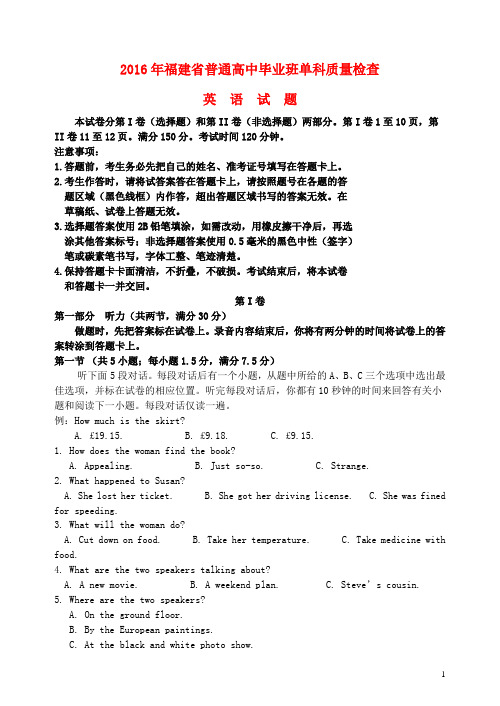
2016年福建省普通高中毕业班单科质量检查英语试题本试卷分第I卷(选择题)和第II卷(非选择题)两部分。
第I卷1至10页,第II卷11至12页。
满分150分。
考试时间120分钟。
注意事项:1.答题前,考生务必先把自己的姓名、准考证号填写在答题卡上。
2.考生作答时,请将试答案答在答题卡上,请按照题号在各题的答题区域(黑色线框)内作答,超出答题区域书写的答案无效。
在草稿纸、试卷上答题无效。
3.选择题答案使用2B铅笔填涂,如需改动,用橡皮擦干净后,再选涂其他答案标号;非选择题答案使用0.5毫米的黑色中性(签字)笔或碳素笔书写,字体工整、笔迹清楚。
4.保持答题卡卡面清洁,不折叠,不破损。
考试结束后,将本试卷和答题卡一并交回。
第I卷第一部分听力(共两节,满分30分)做题时,先把答案标在试卷上。
录音内容结束后,你将有两分钟的时间将试卷上的答案转涂到答题卡上。
第一节(共5小题;每小题1.5分,满分7.5分)听下面5段对话。
每段对话后有一个小题,从题中所给的A、B、C三个选项中选出最佳选项,并标在试卷的相应位置。
听完每段对话后,你都有10秒钟的时间来回答有关小题和阅读下一小题。
每段对话仅读一遍。
例:How much is the skirt?A. £19.15.B. £9.18.C. £9.15.1. How does the woman find the book?A. Appealing.B. Just so-so.C. Strange.2. What happened to Susan?A. She lost her ticket.B. She got her driving license.C. She was fined for speeding.3. What will the woman do?A. Cut down on food.B. Take her temperature.C. Take medicine with food.4. What are the two speakers talking about?A. A new movie.B. A weekend plan.C. Steve’s cousin.5. Where are the two speakers?A. On the ground floor.B. By the European paintings.C. At the black and white photo show.第二节(共15小题;每小题1.5分,满分22.5分)听下面5段对话或独白。
厦门市2016高考英语二轮:完形填空解练习(3)及答案
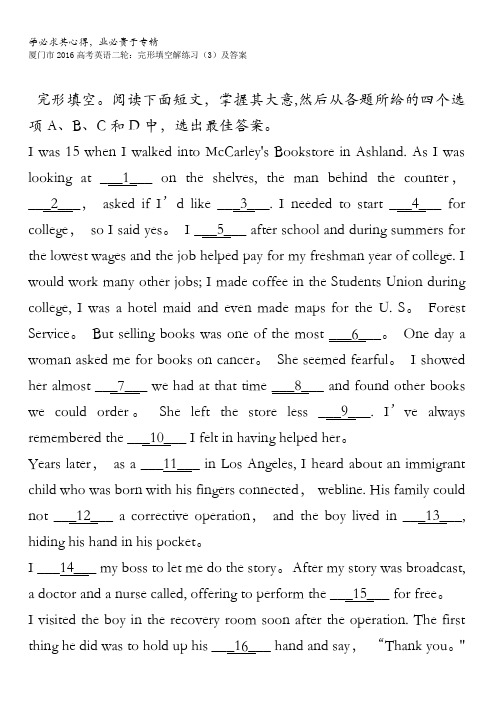
厦门市2016高考英语二轮:完形填空解练习(3)及答案完形填空。
阅读下面短文,掌握其大意,然后从各题所给的四个选项A、B、C和D中,选出最佳答案。
I was 15 when I walked into McCarley's Bookstore in Ashland. As I was looking at ___1___ on the shelves, the man behind the counter,___2___,asked if I’d like ___3___. I needed to start ___4___ for college,so I said yes。
I ___5___ after school and during summers for the lowest wages and the job helped pay for my freshman year of college. I would work many other jobs; I made coffee in the Students Union during college, I was a hotel maid and even made maps for the U. S。
Forest Service。
But selling books was one of the most ___6___。
One day a woman asked me for books on cancer。
She seemed fearful。
I showed her almost ___7___ we had at that time ___8___ and found other books we could order。
She left the store less ___9___. I’ve always remembered the ___10___ I felt in having helped her。
福建省高三英语毕业班单科质量检查试题-人教版高三全册英语试题
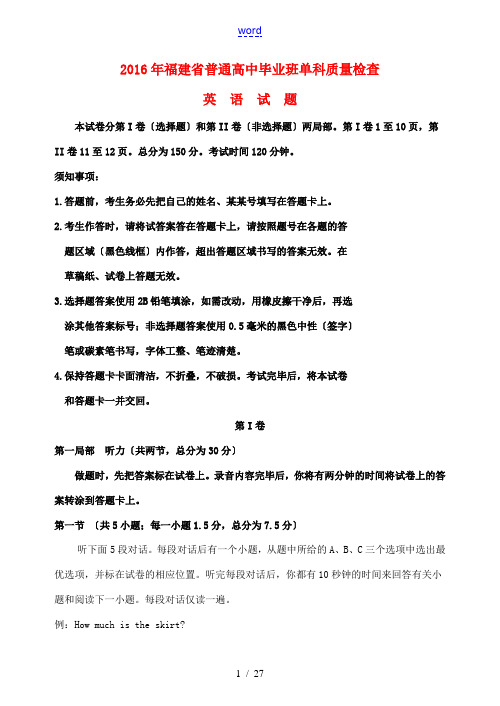
2016年福建省普通高中毕业班单科质量检查英语试题本试卷分第I卷〔选择题〕和第II卷〔非选择题〕两局部。
第I卷1至10页,第II卷11至12页。
总分为150分。
考试时间120分钟。
须知事项:1.答题前,考生务必先把自己的姓名、某某号填写在答题卡上。
2.考生作答时,请将试答案答在答题卡上,请按照题号在各题的答题区域〔黑色线框〕内作答,超出答题区域书写的答案无效。
在草稿纸、试卷上答题无效。
3.选择题答案使用2B铅笔填涂,如需改动,用橡皮擦干净后,再选涂其他答案标号;非选择题答案使用0.5毫米的黑色中性〔签字〕笔或碳素笔书写,字体工整、笔迹清楚。
4.保持答题卡卡面清洁,不折叠,不破损。
考试完毕后,将本试卷和答题卡一并交回。
第I卷第一局部听力〔共两节,总分为30分〕做题时,先把答案标在试卷上。
录音内容完毕后,你将有两分钟的时间将试卷上的答案转涂到答题卡上。
第一节〔共5小题;每一小题1.5分,总分为7.5分〕听下面5段对话。
每段对话后有一个小题,从题中所给的A、B、C三个选项中选出最优选项,并标在试卷的相应位置。
听完每段对话后,你都有10秒钟的时间来回答有关小题和阅读下一小题。
每段对话仅读一遍。
例:How much is the skirt?A. £19.15.B. £9.18.C. £9.15.1.How does the woman find the book?A. Appealing.B. Just so-so.C. Strange.2. What happened to Susan?A. She lost her ticket.B. She got her driving license.C. She was fined for speeding.3. What will the woman do?A. Cut down on food.B. Take her temperature.C. Take medicine with food.4. What are the two speakers talking about?A. A new movie.B. A weekend plan.C. Steve’s cousin.5. Where are the two speakers?A. On the ground floor.B. By the European paintings.C. At the black and white photo show.第二节〔共15小题;每一小题1.5分,总分为22.5分〕听下面5段对话或独白。
福建省普通高中毕业班质量检查英语
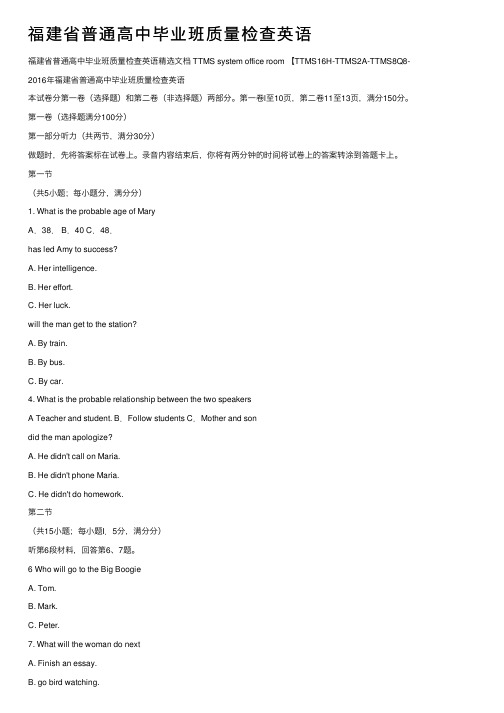
福建省普通⾼中毕业班质量检查英语福建省普通⾼中毕业班质量检查英语精选⽂档 TTMS system office room 【TTMS16H-TTMS2A-TTMS8Q8-2016年福建省普通⾼中毕业班质量检查英语本试卷分第⼀卷(选择题)和第⼆卷(⾮选择题)两部分。
第⼀卷l⾄10页,第⼆卷11⾄13页,满分150分。
第⼀卷(选择题满分100分)第⼀部分听⼒(共两节,满分30分)做题时,先将答案标在试卷上。
录⾳内容结束后,你将有两分钟的时间将试卷上的答案转涂到答题卡上。
第⼀节(共5⼩题;每⼩题分,满分分)1. What is the probable age of MaryA.38. B.40 C.48.has led Amy to success?A. Her intelligence.B. Her effort.C. Her luck.will the man get to the station?A. By train.B. By bus.C. By car.4. What is the probable relationship between the two speakersA Teacher and student. B.Follow students C.Mother and sondid the man apologize?A. He didn't call on Maria.B. He didn't phone Maria.C. He didn't do homework.第⼆节(共15⼩题;每⼩题I.5分,满分分)听第6段材料,回答第6、7题。
6 Who will go to the Big BoogieA. Tom.B. Mark.C. Peter.7. What will the woman do nextA. Finish an essay.B. go bird watching.C. Make phone calls.听第7段材料,回答第8、9题。
高三英语5月适应性考试试题-人教版高三全册英语试题
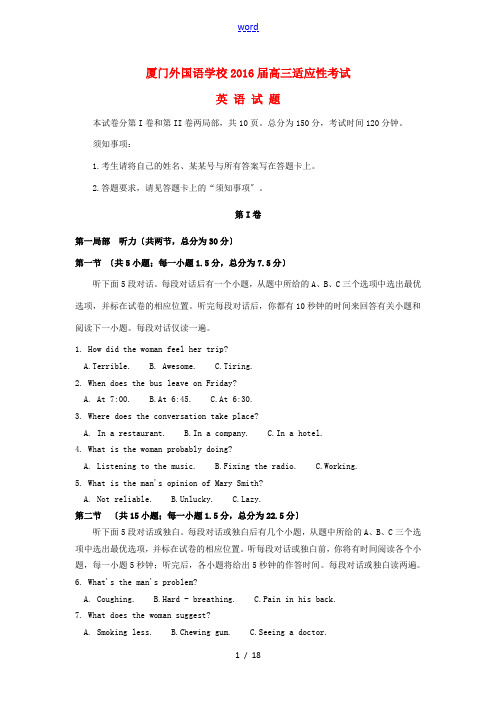
厦门外国语学校2016届高三适应性考试英语试题本试卷分第I卷和第II卷两局部,共10页。
总分为150分,考试时间120分钟。
须知事项:1.考生请将自己的姓名、某某号与所有答案写在答题卡上。
2.答题要求,请见答题卡上的“须知事项〞。
第I卷第一局部听力〔共两节,总分为30分〕第一节〔共5小题;每一小题1.5分,总分为7.5分〕听下面5段对话。
每段对话后有一个小题,从题中所给的A、B、C三个选项中选出最优选项,并标在试卷的相应位置。
听完每段对话后,你都有10秒钟的时间来回答有关小题和阅读下一小题。
每段对话仅读一遍。
1. How did the woman feel her trip?A.Terrible.B. Awesome.C.Tiring.2. When does the bus leave on Friday?A. At 7:00.B.At 6:45.C.At 6:30.3. Where does the conversation take place?A. In a restaurant.B.In a company.C.In a hotel.4. What is the woman probably doing?A. Listening to the music.B.Fixing the radio.C.Working.5. What is the man's opinion of Mary Smith?A. Not reliable.B.Unlucky.zy.第二节〔共15小题;每一小题1.5分,总分为22.5分〕听下面5段对话或独白。
每段对话或独白后有几个小题,从题中所给的A、B、C三个选项中选出最优选项,并标在试卷的相应位置。
听每段对话或独白前,你将有时间阅读各个小题,每一小题5秒钟;听完后,各小题将给出5秒钟的作答时间。
每段对话或独白读两遍。
6. What's the man's problem?A. Coughing.B.Hard - breathing.C.Pain in his back.7. What does the woman suggest?A. Smoking less.B.Chewing gum.C.Seeing a doctor.听第7段材料,回答第8至9题。
